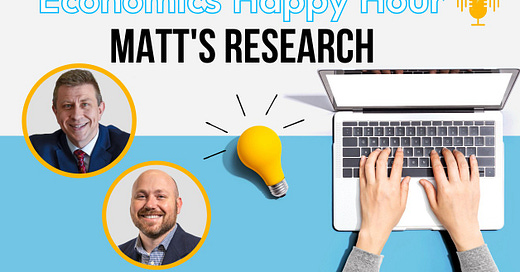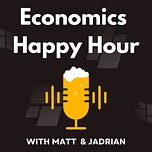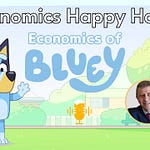What could a research arc look like? Matt shares the story of his career pivot from a pure experimental economist to one that includes researching on teaching economics with pop culture. Matt’s early research on cigarette packaging and sin taxes measured how graphic warning labels influenced consumer behavior. His most recent work? A paper on the game show Cutthroat Kitchen that explores how people value the prestige of winning over the money they win. Throughout the episode, Matt reflects on what drives his research choices and how his interests have evolved.
In this episode, we discuss:
How Matt’s research evolved from public health and pop culture
Why experimental auctions have always been a central method in his work
How teaching-focused research and pedagogical experiments caught his attention
Reflections on following curiosity over specialization
And a whole lot more!
Catch up on some old episodes:
You can also listen to us on Google Podcasts, TuneIn Radio, and Apple Podcasts. If one of these is your go-to podcast service, be sure to rate us and subscribe!
Watch this episode on YouTube:
Some show notes:
Matt and Jadrian are wrapping up spring break and Jadrian is easing back into the semester. (Matt is still on sabbatical.) Jadrian brought back a four-pack of Almost Famous Pickle Beer from East End Brewing Company when he took a recent trip to Pittsburgh — a cucumber gose created in partnership with Primanti Bros. After an overlong stay in the freezer, it ended up more slushie than beer, but still drinkable. Matt wasn’t convinced the pickle beer was for him, so he went a different route with a glass of Catalonian wine.
A few episodes ago, Matt asked Jadrian about his research. Today Matt takes the spotlight this week as Jadrian turns the questions toward his co-host’s research journey. The conversation starts with Matt’s early work in experimental economics, where he studied how consumers respond to changes in food labeling and cigarette packaging. One of his most-cited streams of research involves using graphic health warnings on cigarette packs in experimental auctions to test how demand changed — work that eventually informed policy discussions.
From there, they explore Matt’s broader use of auctions in behavioral research, especially in public health. His projects have included examining preferences for e-cigarettes, smokeless tobacco, and vaccines. These studies often relied on grant funding and collaborative teams, allowing Matt to explore how people respond to information and make decisions in controlled but realistic environments.
A turning point in Matt’s career came with a pivot toward using pop culture as a lens for economics research. Matt currently has an NBER working paper with several other authors that looks at how Cutthroat Kitchen contestants’ bidding behavior reveals the value of prestige in addition to prize money. The show’s auction-style format turned out to be an ideal setting to observe economic decision-making in a high-stakes, real-world context.
Matt reflects on the flexibility of working at a teaching-focused institution, where he’s been able to follow ideas across disciplines and collaborate widely. While he began as a specialist in experiments, he now sees himself as a generalist economist, pursuing topics that are both interesting and accessible — whether that’s public health, pedagogy, or reality TV.
This week’s pop culture references:
Jadrian was reminded of a paper that focused on Cash Cab, a game show he once hoped to study during grad school. He started collecting data to analyze risk aversion in contestant choices, only to find that someone else had just published a similar paper in JEBO, focused on how group dynamics influence risk-taking in the game. If you don’t remember the show, here’s a snippet of one episode:
Matt discussed a clip in Cutthroat Kitchen that explores how contestants decide who to sabotage. The clip highlights moments where sabotage decisions seem driven by spite or bias rather than strategy — like a contestant declaring she wanted to “wipe the smile off little blondie’s face.” These choices raise questions about fairness, discrimination, and revenge.
















Share this post